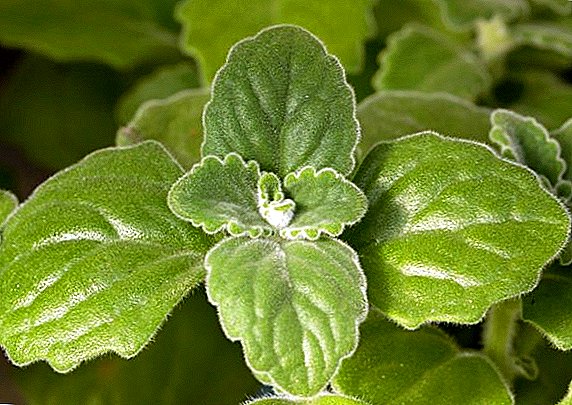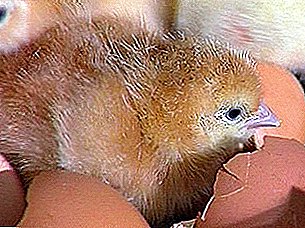 Rasklev among turkey poults is a rather common and extremely unpleasant phenomenon. Ignoring this problem, or not responding to it properly, can in the shortest possible time cause heavy losses to the population of chicks in farms.
Rasklev among turkey poults is a rather common and extremely unpleasant phenomenon. Ignoring this problem, or not responding to it properly, can in the shortest possible time cause heavy losses to the population of chicks in farms.
Causes of turkey poults
Rasklev - nothing but a manifestation feathered cannibalism. The beginning of this unpleasant phenomenon usually becomes egg cracking, after which birds migrate to themselves or their less powerful brethren.
Consider a number of reasons due to which this phenomenon occurs most often.  Improper functioning of the digestive tract. As a result, the chicks have diarrhea, and constantly dirty feathers in the anal zone provoke other chicks to rake. If you do not satisfy the growing body's need for proteins, acidosis often occurs, one of the symptoms of which is weakening of the sphincter. Other turkey poults begin to peck at the affected place.
Improper functioning of the digestive tract. As a result, the chicks have diarrhea, and constantly dirty feathers in the anal zone provoke other chicks to rake. If you do not satisfy the growing body's need for proteins, acidosis often occurs, one of the symptoms of which is weakening of the sphincter. Other turkey poults begin to peck at the affected place.
To resolve this problem should normalize turkey poults. Most often this is enough to stop the epidemic epidemic of cannibalism. Chicks under the age of 1 month need for normal growth the protein content in the diet at the level of 25-27%; this indicator gradually decreases, and reaches 14% by the age of 18-19 weeks.
Learn more about the correct feeding of turkey poults, in particular, daily turkey poults.
Thanks to the bright light in the house turkeys can see the hen cloaca, which is constantly bleeding due to the continuous stress experienced during the laying period.  It should reduce the intensity of illumination in the place where the birds are kept, so that they cannot see the bleeding anal area of the hen.
It should reduce the intensity of illumination in the place where the birds are kept, so that they cannot see the bleeding anal area of the hen.
Hazing in the livestock. When a new turkey hits the flock, the rest strive to pinch him by the wing or head - such a herd instinct can kill a novice. In order to avoid the development of such a phenomenon, it is desirable to group the poults on the basis of age indicators.
Important! There are breeds of turkeys that are genetically predisposed to extinguishing. They cannot be kept together with the rest of the bird. Such turkeys all their life must be kept in isolation.
Weak or susceptible chick usually turns into a sacrifice. In this case, sick or weakened turkey poults should be removed from the total mass.
Poor conditions, poor sanitation, poor nutrition and stale dirty water - quite often these factors cause cannibalism. The chick, attacking the flesh of his fellow man, thus tries to compensate for the nutrient deficiency.  It is necessary to solve the problem with cramped space, normalize the conditions of walking. If a bird has grass under its feet, in which you can find something tasty, it is unlikely to start pecking another bird, it is better to find a worm. It should also normalize food, eliminate the deficiency of minerals and vitamins.
It is necessary to solve the problem with cramped space, normalize the conditions of walking. If a bird has grass under its feet, in which you can find something tasty, it is unlikely to start pecking another bird, it is better to find a worm. It should also normalize food, eliminate the deficiency of minerals and vitamins.
It happens that the chicks do not peck fellows, but themselves. This phenomenon is observed due to protein imbalance in the menu. The anal zone begins to crack and bleed, which causes the turkey pain, as a result, it bites and stings itself. It is necessary to adjust the protein balance in the diet, just as described above.
Did you know? In the Tuapse district of the Krasnodar Territory there are the mountains Turkey, Turkey and Turkey.
Dry air - also a fairly common cause of this phenomenon. The turkey tries to isolate the secret of the oil gland, as a result of which the painful sensations cause the chick to bite itself.  Try to observe the optimum temperature regime for chickens. In the first 7 days, this is approximately 35-37 ° C. If the temperature rises higher, the air humidity drops, which causes the oil gland to work hard. Lower temperatures drive chicks into a dense group. Both options lead to rasklevyam.
Try to observe the optimum temperature regime for chickens. In the first 7 days, this is approximately 35-37 ° C. If the temperature rises higher, the air humidity drops, which causes the oil gland to work hard. Lower temperatures drive chicks into a dense group. Both options lead to rasklevyam.
Find out also what to do in the event of a bite: the chicks peck at each other, the hens peck at the rooster, the hens peck at each other.
Treatment of injured turkey poults
First of all, it is necessary to isolate the injured chicks. Such turkey poults weaken, lose their appetite. As a result of weakness, they become victims of attacks by stronger brethren. They are forced to hide, do not eat, and soon die from exhaustion.
If turkeys are slightly injured, they must process with antiseptic. For these purposes, use the drug "ASD-2F". First, an open wound is rubbed with a solution of hydroperit, and then “ASD-2F” is used: the preparation is given to the bird with water or mixed feed inside. When external treatment of wounds using 2-20% solution.  Manipulations need to be carried out several times daily, until the wounds heal.
Manipulations need to be carried out several times daily, until the wounds heal.
Another means of treatment is the introduction of the feed. amino acids (methionine, arginine and cystine) together with preparations containing bromine (potassium bromide, bromosept, etc.). To restore the feather cover in the composition of the feed give sulfates of iron, manganese, copper, sodium selenite and cobalt chloride.
An oversight can cause the most serious injuries of poults. Often, the chicks do not just hit each other's skin, but also pull out their eyes, pieces of flesh. To prevent this from happening, you should regularly inspect the livestock, immediately moving the wounded individuals away. Poults that have received serious injuries are unlikely to be able to leave.
Did you know? A running turkey can reach speeds in excess of 40 km / h. The current record for people set by Usain Bolt in 2008 is 45 km / h in the 100 m race.
Preventive measures
The most radical method of prophylaxis is considered debicking - pruning beak under the age of 15 days. This operation is performed on all chicks at one time, at night or in the morning, at a time when the air temperature is the lowest. If a chick is missed, he will cripple everyone else, since he will not be able to fight back.  After the procedure in the house, they make a brighter light, increase the temperature of the air by a couple of degrees, apply food with high nutritional properties.
After the procedure in the house, they make a brighter light, increase the temperature of the air by a couple of degrees, apply food with high nutritional properties.
Read also about the cultivation of poults (incubation of eggs, care from the first days of life); on how to make a brood for turkey poults with your own hands and distinguish between poults on the floor.
Beak cut no more than a third of the length. Do it carefully, trying not to hurt the blood vessels. After some time, the operation is repeated.
Debicked chicks cannot peck at each other, and feed loss is also reduced. However, this procedure is carried out only as a last resort, when all other measures have been ineffective.
Video: debick with the example of chickens
Less radical preventive measures:
- Reduces aggressive mood turkeys presence in the diet of a sufficient amount of fiber.
- The use of crushed grain in feeding also helps to avoid this unpleasant phenomenon.
- A balanced and varied diet in general is very important in the prevention of rasklevyov. Veterinarians are advised to introduce a lot of salt, oats, meal, makuhi in the menu. These food components make the bird less susceptible to aggression.
- A significant role is played by the level of lighting in the house and its spectrum. Moderate white or bluish lighting is most conducive to a quiet way of life of the house.
- The addition of abrasives to food contributes to the fact that the beak of turkeys grind off. Wounds inflicted by such a beak are not so dangerous.
- Significantly reduces the likelihood of this problem and the site of normal size for walking birds.
Important! Turkey poults are very demanding in terms of housing conditions and feed composition. A minor inconsistency with the necessary standards can seriously affect health. Do not forget to constantly monitor the balance and completeness of the diet, and if necessary, make changes to it in time.
Video: solving the problem of eating turkeys
Poultry farmers experience: reviews


It should be borne in mind that pecking is a problem that is significant not only for chicks, but adult birds are also susceptible to it. If you let it drift, the consequences for the livestock may be the most dire. It is much easier to stop possible troubles at the stage of their occurrence than to try to get rid of them later. So it is better to take preventive measures in advance.












